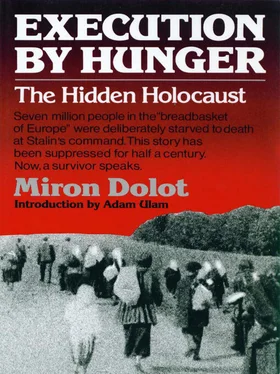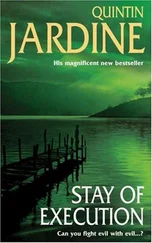These dead were farmers from the neighboring villages and their families, all victims of starvation. Deprived of all means of existence, the farmers saw their only chance of survival in escaping to the city where they hoped to find some job, some food, and some help. Despite the prohibitions on leaving the boundaries of their villages, they moved in throngs to the county seat, swelling and annoying its population and the city management. They appeared on the doorsteps of houses, begging for a crumb of bread, or even a piece of potato peel, usually in vain. The city inhabitants, with their own meager food rations, could not give the villagers sufficient food to save them from starvation. There were simply too many of them. They were standing or lying in the city streets, in the marketplaces, at the railroad stations, under fences, in backyards, in the ditches by the streets and roads. They became such everyday sights that the city people mostly passed them by, ignoring them and their pleas. Thus, after fruitlessly trying everything and going everywhere, the villagers and their families met their inevitable deaths. The dead lay undiscovered or ignored for days, like driftwood.
Often the starving people would be rounded up like cattle by the militiamen, taken beyond the city limits, and left to their fate. The dead, and those barely alive and unable to walk anymore, were all loaded onto trucks or horse-driven carts, and hauled away somewhere outside the city limits. They were dumped into ravines or in the dumping grounds for sewage along the roadsides. Weren’t these people entitled to at least a decent burial in the cemetery, even in common graves?
When mother and I finally arrived at the Torgsin, there was already a great crowd of starving people there. Emaciated and skeletonlike, or with swollen, puffed-up bodies, human beings stood around in the streets, leaned against the telephone poles and walls, or lay on the sidewalks and in the street gutters. They were patiently waiting for some merciful shoppers to share a pittance of their purchases with them. Others were begging noisily, shouting and crying; the rest held out their hands quietly and silently. Here and there among the crowds we could see rigid bodies of the dead, but nobody paid any attention to them….
We were informed at the entrance to the Torgsin that all shoppers were required to first go to the office across the street for an appraisal of their valuables. Having found the office, we were directed to an official inside. The official, a fat man behind iron grates, took Mother’s medallion without even looking at us, weighed it quickly, and tossed it into a drawer. He then handed us a form, requiring our name, address, and the type of our valuable. Afterwards, we received a receipt indicating the sum we were authorized to spend: exactly 18 rubles. Another hour passed as we stood in line waiting to enter the Torgsin. Finally we were inside.
What a sight it was. I could not believe my eyes; it was like a dream. Here was everything we needed and more. There were things we had never even heard of nor seen in our lives. There were even groceries known to me only from books I had read. All the items were tastefully arranged and exhibited in cases under glass. Looking at these splendid assortments of foods, I began to feel dizzy. For months, I hadn’t even seen ordinary food. I had forgotten the taste of real bread. Now, everywhere I looked were these wonderful things to eat.
I was completely overcome by hunger pangs; they were so violent that I could hardly manage to stand upright. Savage hunger gnawed at my stomach, and there was a choking sensation in my throat, as if someone’s hands were squeezing and twisting my neck. In my agony, I was about to burst out crying, but at that moment, I felt my mother’s hands on my shoulders. She understood my emotional state. Perhaps she felt the same way. As I looked at her, she smiled at me and said: “Have some pride, my son!” These words calmed me and gave me strength to overcome the physical weakness.
We decided to buy only the basic and most essential products, so, when our turn came at the counter, we quickly selected what we needed without much hesitation and difficulty. We bought some butter, salt pork, lard, two loaves of bread, sugar, and a few miscellaneous items to make up exactly 18 rubles. Most of these items were neatly packed in cans, boxes or bags. To our astonishment, we discovered that the labels on all of them bore the trade mark “Made in USSR,” meaning they were destined for foreign markets.
After we finished shopping, we left the store as unobtrusively as possible and started our trip back home. We did not fear robbers during daylight, for we were in the same position as the rest of the starving villagers, and moreover, looked like them: thin and haggard, dressed in rags, with beggars’ sacks on our shoulders. No one in his right mind would have suspected that in those potato sacks we carried a few pounds of salt pork and other staples which to us were the greatest treasures on earth.
Already on the way home, we could not resist the temptation to eat some of the bread and salt pork. It tasted heavenly. Mother suggested that we not eat too much for fear we would become sick. Now it was getting dark, and we were afraid to walk home the same way we had come. Consequently, we decided to go to a railroad station in the hope of catching a train to a station just three miles away from our village. This would shorten our walking distance and it would keep us in a safer populated area.
As we approached the station, a freight train slowly passed to our right. We noticed people gathered around something on the tracks. We joined them, and saw a pile of mangled human bodies in a pool of blood. Somebody said that it was a suicide; a woman carrying a child had jumped under the oncoming train. The onlookers began leaving the scene one by one, and the crushed bodies of the mother and her child remained lying there without any further attention. No one shed a tear or showed any emotion for their tragic end; all were too numb.
We walked to the station building. There were great crowds of people there also, both inside and out. They had come, as did all of us, from the surrounding villages. This was their last hope to find some food. They hoped that some sympathetic traveler would throw them a piece of bread from the train window. Some had hopes of finding a job. Still others brought with them the best of their belongings with the prospect of exchanging them for food, or selling them for money. They sat patiently on the cement floor of the platform, wet from snow, exhibiting their wares: beautifully hand-embroidered Ukrainian national costumes made of homespun materials, along with homemade richly embroidered tablecloths, embroidered towels, handwoven rugs. Some of them had been kept in trunks or in the hopechests of women for decades or even centuries as family heirlooms. But these valuable articles found no buyers at this time. Very few passenger trains passed by, and local people were not interested in buying anything but food. Except for Party and government officials, and black marketeers, all were hungry or starving.
Most of those who were crowding the station’s waiting hall inside were trying to buy tickets somewhere north of Ukraine, to Russia, where there was no famine. But their efforts were futile. Train tickets to Russia were officially prohibited to Ukrainian farmers with few exceptions. Only those with special certificates permitting them to leave the collective farm for a specific place could buy a train ticket to Russia. Nevertheless, the starving people tried their luck. They had nothing more to lose and nothing else to do, especially now that the fields, rivers, and forests were covered with deep snow. As a result, they flocked to the railroad stations because each train was bringing some ray of hope, some good news. Above all, there was the possibility that in spite of all prohibitions, one would somehow be able to board the train to the north. They kept dreaming of the impossible. They had thoughts of traveling on the roof of the train, or underneath the railroad car, on the steps, on buffer platforms, and on the bumpers.
Читать дальше












